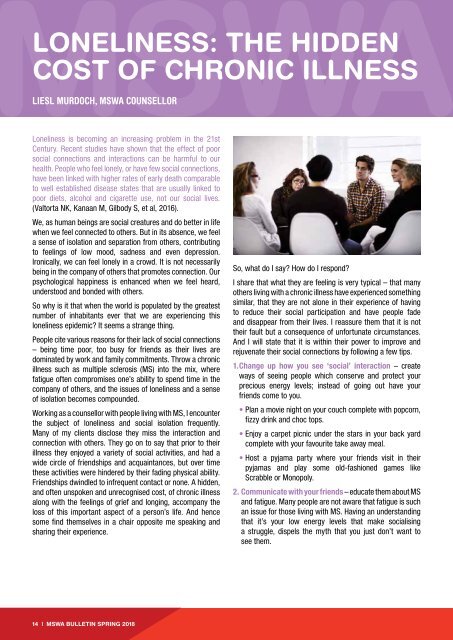You also want an ePaper? Increase the reach of your titles
YUMPU automatically turns print PDFs into web optimized ePapers that Google loves.
LONELINESS: THE HIDDEN<br />
COST OF CHRONIC ILLNESS<br />
LIESL MURDOCH, MSWA COUNSELLOR<br />
Loneliness is becoming an increasing problem in the 21st<br />
Century. Recent studies have shown that the effect of poor<br />
social connections and interactions can be harmful to our<br />
health. People who feel lonely, or have few social connections,<br />
have been linked with higher rates of early death comparable<br />
to well established disease states that are usually linked to<br />
poor diets, alcohol and cigarette use, not our social lives.<br />
(Valtorta NK, Kanaan M, Gilbody S, et al, 2016).<br />
We, as human beings are social creatures and do better in life<br />
when we feel connected to others. But in its absence, we feel<br />
a sense of isolation and separation from others, contributing<br />
to feelings of low mood, sadness and even depression.<br />
Ironically, we can feel lonely in a crowd. It is not necessarily<br />
being in the company of others that promotes connection. Our<br />
psychological happiness is enhanced when we feel heard,<br />
understood and bonded with others.<br />
So why is it that when the world is populated by the greatest<br />
number of inhabitants ever that we are experiencing this<br />
loneliness epidemic? It seems a strange thing.<br />
People cite various reasons for their lack of social connections<br />
– being time poor, too busy for friends as their lives are<br />
dominated by work and family commitments. Throw a chronic<br />
illness such as multiple sclerosis (MS) into the mix, where<br />
fatigue often compromises one’s ability to spend time in the<br />
company of others, and the issues of loneliness and a sense<br />
of isolation becomes compounded.<br />
Working as a counsellor with people living with MS, I encounter<br />
the subject of loneliness and social isolation frequently.<br />
Many of my clients disclose they miss the interaction and<br />
connection with others. They go on to say that prior to their<br />
illness they enjoyed a variety of social activities, and had a<br />
wide circle of friendships and acquaintances, but over time<br />
these activities were hindered by their fading physical ability.<br />
Friendships dwindled to infrequent contact or none. A hidden,<br />
and often unspoken and unrecognised cost, of chronic illness<br />
along with the feelings of grief and longing, accompany the<br />
loss of this important aspect of a person’s life. And hence<br />
some find themselves in a chair opposite me speaking and<br />
sharing their experience.<br />
So, what do I say? How do I respond?<br />
I share that what they are feeling is very typical – that many<br />
others living with a chronic illness have experienced something<br />
similar, that they are not alone in their experience of having<br />
to reduce their social participation and have people fade<br />
and disappear from their lives. I reassure them that it is not<br />
their fault but a consequence of unfortunate circumstances.<br />
And I will state that it is within their power to improve and<br />
rejuvenate their social connections by following a few tips.<br />
1. Change up how you see ‘social’ interaction – create<br />
ways of seeing people which conserve and protect your<br />
precious energy levels; instead of going out have your<br />
friends come to you.<br />
• Plan a movie night on your couch complete with popcorn,<br />
fizzy drink and choc tops.<br />
• Enjoy a carpet picnic under the stars in your back yard<br />
complete with your favourite take away meal.<br />
• Host a pyjama party where your friends visit in their<br />
pyjamas and play some old-fashioned games like<br />
Scrabble or Monopoly.<br />
2. Communicate with your friends – educate them about MS<br />
and fatigue. Many people are not aware that fatigue is such<br />
an issue for those living with MS. Having an understanding<br />
that it’s your low energy levels that make socialising<br />
a struggle, dispels the myth that you just don’t want to<br />
see them.<br />
14 | MSWA BULLETIN SPRING <strong>2018</strong>


















